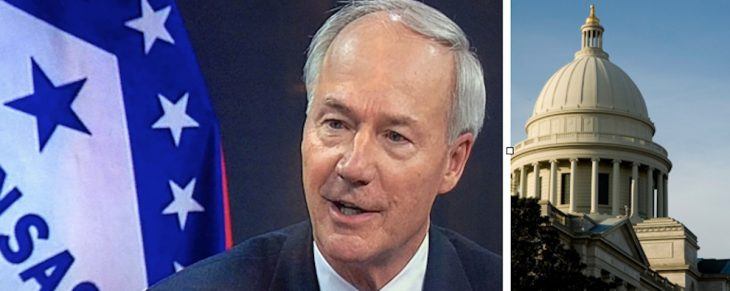Gov. Hutchinson hails victory after federal court decision to block Planned Parenthood funding
by August 16, 2017 6:59 pm 831 views

Gov. Asa Hutchinson on Wednesday (Aug. 16) applauded a decision by the U.S. Eighth Circuit Court of Appeals to vacate a preliminary injunction by a federal court judge in Arkansas that prevented the governor from removing Planned Parenthood from the state’s Medicaid program.
“(This) decision allows the state to proceed with the termination of Planned Parenthood as a Medicaid provider,” Hutchinson said in a statement. “This is a substantial legal victory for the right of the state to determine whether Medicaid providers are acting in accordance with best practices and affirms the prerogative of the state to make reasoned judgments on the Medicaid program.”
Almost exactly two years ago, Gov. Hutchinson directed the Department of Human Services to end its agreements with Planned Parenthood of Arkansas and Eastern Oklahoma, now Planned Parenthood Great Plains. Then-DHS Director John Selig sent a letter dated Aug. 14, 2015 to Jill June, president and CEO of the Arkansas chapter of Planned Parenthood, informing her of the move.
“It is apparent that after the recent revelations on the actions of Planned Parenthood, that this organization does not represent the values of the people of our state and Arkansas is better served by terminating any and all existing contracts with them. This includes their affiliated organization, Planned Parenthood of Arkansas …,” Hutchinson said in the letter.
Planned Parenthood officials did not immediately respond to a Talk Business & Politics request for comment. Last year, the nonprofit reorganized and changed its name to Planned Parenthood Great Plains, serving patients in Arkansas, Kansas, Missouri and Oklahoma.
In Arkansas, the organization has two health centers in Little Rock and Fayetteville, providing nearly 4,400 patients with a wide-ranged of reproductive health services, including well-woman exams, cancer screenings, testing and treatment for sexually transmitted infections, HIV testing and risk reduction counseling, a full range of FDA-approved birth control methods, pregnancy testing and options counseling, and other preventive health services.
According to DHS, the state has been reimbursing Planned Parenthood clinics in Little Rock and Fayetteville on a case-by-case basis for family planning, pharmacy and gynecological services but has not paid for abortions using Medicaid dollars.
DHS spokeswoman Amy Webb could not immediately provide details on total Medicaid reimbursements Planned Parenthood has received in the past three years. However, before the Gov. Hutchinson’s announced his decision to end Planned Parenthood funding in 2015, the nonprofit had been reimbursed by DHS in the range from a low of $127,000 in 2012 to a high of nearly $242,000 in 2010. The agency received nearly $169,000 in 2011, and just under $140,000 in 2013 and 2014.
Hutchinson’s actions in 2015 followed the release of a series of controversial undercover videos by a pro-life group, The Center for Medical Progress, that allegedly showed Planned Parenthood executives discussing the sale of fetal tissue for profit. In September 2016, after Planned Parenthood filed a lawsuit against the state, U.S. District Judge Kristine Baker halted the Arkansas Department of Human Services (DHS) from suspending payments to Planned Parenthood for any services to Medicaid patients in the state. That ruling came after an earlier decision by Baker to block the state from denying Medicaid funds to three unnamed women suing the state.
In January 2016, Baker also approved the nonprofit group’s request expanding the lawsuit to include any Medicaid patients receiving or seeking treatment from the organization.
“Should the court fail to issue injunctive relief, members of the patient class will be denied their choice of provider for family planning services,” wrote Baker, who sits on the U.S. District Court for the Eastern District of Arkansas in Little Rock.
That case, Planned Parenthood of Arkansas & Eastern Oklahoma Inc. et al v. (DHS Director) Cindy Gillespie, was then appealed to the U.S. Court of Appeals for the Eighth Circuit in St. Louis, which is headed by Eighth Circuit Chief Judge Lavenski Smith of Little Rock. A three-judge panel that included U.S. Circuit Judges Steven Colloton, Bobby Shepherd and Michael Melloy voted 2-1 to overturn Baker’s decision.
Colloton, who voted with Shepherd to vacate Baker’s ruling, wrote that Planned Parenthood could have challenged its termination by Gov. Hutchinson through an administrative appeal and judicial review in Arkansas courts, but chose not to do so.
“Instead, three Arkansas patients identified by the Planned Parenthood affiliate sued the Director of the Department … claiming that the Department violated a federal right of the patients under the Medicaid Act to choose any ‘qualified’ provider that offers services that the patients seek,” Colloton wrote.
Colloton added “Given our conclusion that … the Medicaid Act does not give the Jane Does or the class of Medicaid beneficiaries an enforceable federal right that supports a cause of action under (federal law), the plaintiffs do not have a likelihood of success on the merits of their claims.”
Circuit Court Judge Melloy dissented in the 30-page ruling, saying four other circuit courts and numerous district courts have all found “a private right of enforcement” under federal law.
“I would hold that the freedom-of-choice provision does create an individual right enforceable under (the law). That right allows individuals to challenge a state’s actions when a provider’s Medicaid Agreement is terminated for reasons unrelated to the provider’s qualifications,” Mellow wrote. “Additionally, I agree with the district court’s analysis of the (other) factors governing the issuance of an injunction.”
